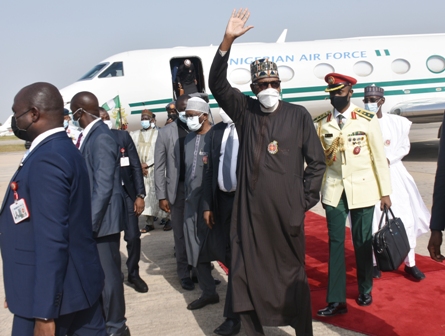Editorial
Taming The Corruption Monster

As the world marked International Anti-Corruption Day yesterday, December 9, 2021, Nigerians have continued to lament widespread corruption and its devastating effects on the country. This year’s theme is, “Your Right, Your Role: Say No To Corruption.” It seeks to highlight the rights and responsibilities of everyone in tackling corruption.
The anti-corruption day is observed annually to promote the cause of collective action in preventing corruption and this year’s theme is ideally suited for such mandate. We must unite to promote resilience and integrity at all levels of society. The leaders of all sectors of business, national and sub-national governments have a major role to play in strengthening measures and policies to bring about a culture of integrity across the sectors.
The United Nations General Assembly (UNGA) adopted Resolution 58/4, which is the United Nations Convention Against Corruption on October 31, 2003. The Assembly also designated December 9 as World Anti-Corruption Day to raise awareness about corruption and the role of the Convention in battling and preventing it. The Convention came into force in December, 2005.
According to the United Nations, “Every year, $1 trillion is paid in bribes while an estimated $2.6 trillion are stolen through corruption, a sum equivalent to more than five per cent of the global GDP. In developing countries, according to the United Nations Development Programme (UNDP), funds lost to corruption are estimated at 10 times the amount of official development assistance.”
It is not only countries that need to unite and face this global problem with shared responsibility, every person has a role to play to prevent and counter corruption. To achieve this, policies, systems and measures need to be in place for people to be able to speak up and say ‘no’ to corruption. The government must put in place effective whistle-blower protection to ensure that persons who speak up are protected from retaliation.
One challenging issue that seriously affects Nigeria’s economic development and her image internationally is corruption. Despite efforts by the Economic and Financial Crimes Commission (EFCC), the Independent Corrupt Practices and Other Related Offences Commission (ICPC) and other anti-corruption agencies, corruption continues to hold sway in the country.
The ICPC Act (2000) Section (2) defines corruption as including bribery, fraud and other related offences. We are not limiting it to this. President Muhammadu Buhari offered to run for president twice, although he knew that he was unfit and incompetent. This was corrupt behaviour. Under Buhari’s watch as Minister of Petroleum Resources, the Nigerian National Petroleum Corporation (NNPC) under-reports oil sales, which is corruption. Similarly, when our leaders disobey court judgments, it is corruption.
The Civil Society Legislative and Advocacy Centre (CISLAC) repeatedly alleges that corruption is worsening in the country despite being a cardinal focus of the Buhari administration and describes it as monumental. Executive Director of CISLAC, Auwal Musa, said there had been zero per cent commitment to pledges made by President Buhari at the London Corruption Summit of 2016 and warned that Nigeria would remain backwards economically if corruption was not eliminated.
According to ActionAid Nigeria, corruption accounts for low Foreign Direct Investment in the country. It noted that bribery and high-level corruption discouraged investors from doing business in the country and stated that eliminating corruption was crucial to the future well-being of Nigeria, as it would lift millions of Nigerians out of poverty and ensure shared prosperity and dignity for all.
Also lamenting the level of corruption in the country, Human Environmental Development Agenda (HEDA) noted that Nigeria had lost 43 billion dollars to corruption. It bemoaned that Nigeria ranked 34th most corrupt nation in the world with over 100 open corruption cases of funds embezzlement and wrongful possession.
Expressing concern over the endemic corruption in the land, the former Acting Chairman of the EFCC, Mohammed Abba, called for cooperation and commitment among anti-corruption agencies in the country toward implementing the broad goals of the National Anti-Corruption Strategy. This is an excellent alarm that could turn things around if heeded.
No doubt, the impact of corruption on the image of Nigeria is quite negative. Just as it is in its entirety, corruption of any form does no country any good. Instead, it stultifies growth and development. Therefore, efforts must be directed towards creating economic opportunities, reversing anti-people’s policies such as refusal to pay salaries and pension benefits of workers and retirees, reduction of poverty in the country, among others.
The impact of corruption on Nigerian society, including poor service delivery, inadequate infrastructure, bad governance, pervasive and dehumanising poverty, and general underdevelopment, accounts for the inefficiency and unimpressive growth and development, incorporating the possible failure of democracy in Nigeria. Hence, the federal and state authorities need to muster the political will to combat this peril.
Failure to battle corruption in Nigeria has further compounded economic woes by a government that is inept and high-handed. Buhari has failed to curb corruption, which breeds resentment. Many Nigerians are furious that they see so little benefit from the country’s billions of petrodollars, much of which their leaders have squandered. This must end. Our economy must be rescued from the activities of corrupt persons to give the nation a good image.
Editorial
Task Before New Defence Minister
Editorial
HYPREP And The Collapsed Water Tank

Editorial
Resurgence Of Illegal Structures In PH
-

 Politics2 days ago
Politics2 days agoSenate Receives Tinubu’s 2026-2028 MTEF/FSP For Approval
-

 News2 days ago
News2 days agoRSG Lists Key Areas of 2026 Budget
-

 News2 days ago
News2 days agoTinubu Opens Bodo-Bonny Road …Fubara Expresses Gratitude
-

 News2 days ago
News2 days agoDangote Unveils N100bn Education Fund For Nigerian Students
-
News2 days ago
Nigeria Tops Countries Ignoring Judgements -ECOWAS Court
-

 Sports2 days ago
Sports2 days agoNew W.White Cup: GSS Elekahia Emerged Champions
-

 Featured2 days ago
Featured2 days agoFubara Restates Commitment To Peace, Development …Commissions 10.7km Egbeda–Omerelu Road
-
News2 days ago
FG Launches Africa’s First Gas Trading Market, Licenses JEX

